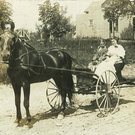We have to be careful what we wish for
To the Editor:
I’d like to compliment The Enterprise on the very comprehensive and informative article on tank train safety, and the accompanying editorial on Feb. 27. This type of reporting and editorial work is one of the many reasons we subscribe to The Enterprise.
The very one-sided, negative, and inflammatory articles on tanker trains we’ve been reading recently in the daily papers is in direct contrast to what we see in The Enterprise.
A few other points worth mentioning:
A big reason for the number of crude-oil trains locally is the procrastination by the federal government in approval of the Keystone XL pipeline extension. It’s a well-known fact that pipelines are far safer and more environmentally friendly than rail, truck, or marine transportation, but so far environmentalists have worked to delay or cancel the proposed pipeline.
As an aside, most New Yorkers don’t realize that most of the fuel oil, kerosene, jet fuel, and gasoline supplied west of Albany is transported by pipeline. That’s product that many years ago was shipped on the Erie Canal and by rail.
Although there are obvious risks involved with rail transport, it must be remembered that this is North American oil going to North American refineries. How many lives have been lost, and environmental disasters created by the United States’ efforts to protect its oil supplies that come from the Middle East?
Finally, on the subject of renewable energy, we have to be careful what we wish for.
Wind turbines on scenic mountaintops have not been a popular concept in the Hilltowns. There are still a lot of yard signs up there denouncing “Industrial Wind Turbines.”
Residential solar panels seem like a great idea, but, when they reach the industrial level, like the recent project at Owens Corning in the town of Bethlehem, we must realize that the systems require a lot of land. Covering the land with solar panels will present a “viewscape” problem, as well as taking land that could be used for crops that are really “green,” like vegetables, hay, corn and soybeans.
Jake Herzog
New Scotland
